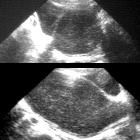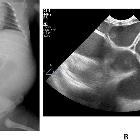fetal ovarian cyst



Fetal ovarian cysts refer to an ovarian cyst detected antenatally in a female fetus. They are relatively uncommon and are usually diagnosed in the 3 trimester .
Epidemiology
From autopsy studies, they are found in up to 30% of fetuses .
Pathology
The exact etiology is not well known at the time of writing but is thought to be related to some form of hormonal stimulation (e.g. fetal gonadotrophins, maternal estrogen and placental beta-HCG) .
A fetal ovarian cyst can be of variable size. It is not thought to change significantly in size over the latter course of pregnancy .
Location / distribution
They tend to be unilateral although bilateral cysts are also rarely seen.
Associations
Other associated anomalies are considered generally rare .
Radiographic features
Antenatal ultrasound
While it is often difficult to accurately diagnose a fetal ovarian cyst sonographically due to many other cystic lesions having similar appearances, it is typically seen as a well-circumscribed unseptated cyst in the fetal pelvis separate from the fetal bladder, stomach and gall bladder. It is often anechoic if simple and uncomplicated. The presence of a small daughter cyst is considered a characteristic feature. Due to the relative laxity of supporting ligaments, the cyst can sometimes rise into the upper abdomen.
If there has a complication there may be fetal ascites (from cyst rupture) on or irregular echogenic intracystic material (from a hemorrhage).
Complications
- in utero cyst rupture
- cyst torsion
- intra-cystic hemorrhage
- compression of adjacent structures
Treatment and prognosis
They are almost always benign simple cysts. Treatment is usually conservative and in selected cases antenatal or neonatal cyst aspiration, laparoscopic cystectomy and laparotomy have been considered. Some advocate intervention if cysts are complex, wonders about the abdomen on serial scans, are larger than 4-5 cm or demonstrate rapid interval enlargement . Spontaneous remission can commonly occur although on occasion can take up several months .
Differential diagnosis
Differential considerations for a cystic lesion in the fetal pelvis include:
- fetal urachal cyst
- fetal enteric duplication cyst
- fetal omental cyst
- uncalcified meconium pseudocyst
- dilated fetal renal pelvis or part of ureter
- dilated loop of bowel
- hydrocolpos
See also
Siehe auch:
- Ovarialzyste
- Hydrokolpos
- fetale intraabdominelle Zysten
- fetale enterale Duplikaturen
- fetale Urachuszyste
- Meconiumpseudozyste
- fetale Omentumzyste
und weiter:

 Assoziationen und Differentialdiagnosen zu neonatale Ovarialzyste:
Assoziationen und Differentialdiagnosen zu neonatale Ovarialzyste:





